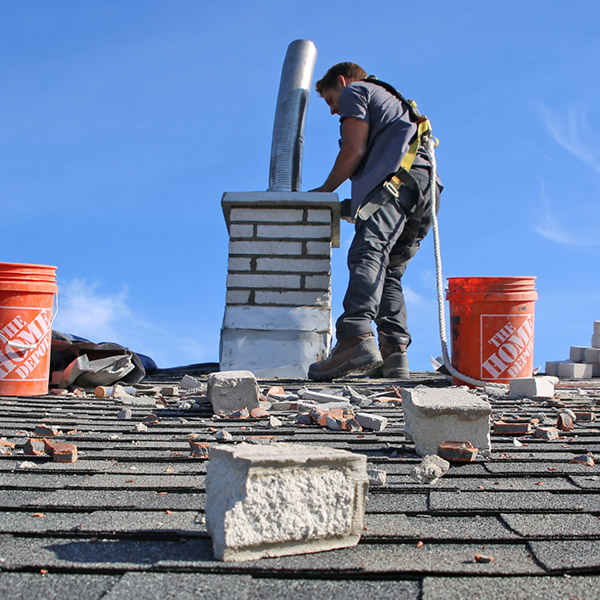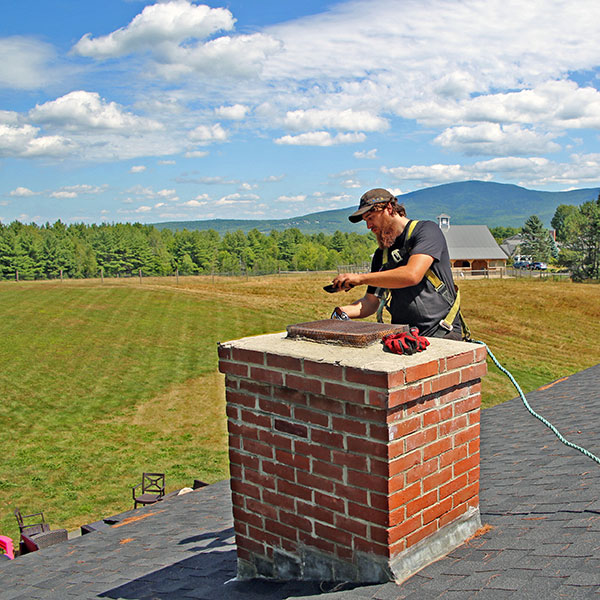If you live in an area prone to lightning strikes, it’s a good idea to take a look at your chimney after a thunder and lightning storm. From your place safe inside your home, you may not even be aware that lightning has hit the chimney. For this reason, it’s important to check for chimney damage as soon as possible after the storm.
How lightning can damage a chimney
 A direct lightning hit on a chimney can destroy a small or large section of the masonry. Depending on the severity of the strike, it can knock a chimney down. A lesser strike may only cause minor cracking or brick damage. Lightning also can cause damage to a chimney’s components such as the chimney cap or flue cover, the chimney crown and the roof flashing that seals the gap between the chimney and the roof.
A direct lightning hit on a chimney can destroy a small or large section of the masonry. Depending on the severity of the strike, it can knock a chimney down. A lesser strike may only cause minor cracking or brick damage. Lightning also can cause damage to a chimney’s components such as the chimney cap or flue cover, the chimney crown and the roof flashing that seals the gap between the chimney and the roof.
Finally, a lightning strike can start a chimney fire, fueled by the creosote that has formed on the inside of your flue. If this happens, call 911 immediately. After safety is restored, schedule a chimney inspection.
Inspecting your chimney after a lightning strike
Assuming it’s safe to get on your roof and you feel comfortable doing so, you should closely examine the entirety of the external chimney after a lightning storm. If lightning has caused serious damage, you probably won’t have to get on the roof to be able to detect it.
If you spot any type of masonry or component damage, it’s important to have that damage addressed as soon as possible by a certified chimney service technician. It is inadvisable to use your fireplace again until the issue has been resolved.
The result of not taking action on a chimney damaged by lightning
When bricks or mortar joints are compromised during a lightning strike, water can infiltrate the structure, where it will begin a cycle of more extensive damage.
Freezing temperatures cause water to freeze and expand, pushing against the bricks and mortar. Larger spaces quickly become available for more incoming water, leading to further decay. The end result can be a chimney that leans to one side or collapses entirely.
 When a chimney cap or flue cover has been damaged by a lightning strike, water can begin running into the internal chimney system from the top. A cracked or destroyed chimney crown makes the bricks beneath it vulnerable to water damage. Roof flashing that is warped or unseated during a lightning storm will give water a clear path to run down into unseen areas of the home.
When a chimney cap or flue cover has been damaged by a lightning strike, water can begin running into the internal chimney system from the top. A cracked or destroyed chimney crown makes the bricks beneath it vulnerable to water damage. Roof flashing that is warped or unseated during a lightning storm will give water a clear path to run down into unseen areas of the home.
Schedule a chimney inspection
The only way to know for certain the extent of lightning-caused damage is to have it professionally inspected. You can spot obvious damage, but a trained inspector can perform a more thorough examination and determine the exact condition of the chimney and tell you what needs to be done to repair it and make it safe to use again.
Black Moose Chimney & Stove of Antrim, NH, provides complete chimney inspections and all levels of chimney repair work by CSIA-certified technicians. If your chimney has been damaged by lightning, call us first at (603) 525-7905 and let us solve the problem.


